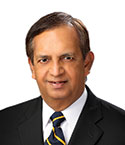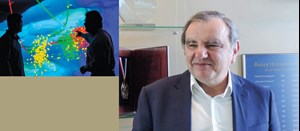Innovative thinkers
Do you believe in destiny? Consider the example of Dr. Mario Ruscev. His scientific education and diverse experiences in research, engineering and operations have preordained him to take on the oil and gas industry’s toughest technology challenges as the Baker Hughes Chief Technology Officer. Dr. Ruscev’s multidisciplinary background has given him the unique intellectual tools and experiences to foster an environment for innovation through empirical research.
After growing up in the suburbs of Paris, Dr. Ruscev pursued an education in the sciences, ultimately earning a doctorate in nuclear physics from the Pierre and Marie Curie University in Paris, and followed it with another doctorate in nuclear physics from Yale University. Early in his career, Dr. Ruscev formed a research team that developed nuclear imaging systems that led to the development of the airport luggage screening system that remains in use today. Subsequently, Dr. Ruscev spent more than two decades with Schlumberger in a number of senior technology and operational roles in France, the UK and Norway. Then, Dr. Ruscev became a CEO for Form Factor, a high-tech enterprise in Livermore, Calif., that specializes in the application of nanotechnology for semiconductor testing. From Silicon Valley, Dr. Ruscev went to the other side of the world to Russia to serve as the CEO of Geotech Seismic Service. As such, Dr. Ruscev is comfortable in diverse scientific, academic, high-tech and oilfield arenas.
Dr. Ruscev believes that the downturn in the industry is due to bursting of the shale bubble, not unlike the dot-com bubble, which brought the Silicon Valley industry down to reality. “Now is the need for innovation in the oil and gas industry to increase productivity and operational efficiency,” Dr. Ruscev explained.
Dr. Ruscev is leading the effort at Baker Hughes to use what is conventionally described as “big data” to improve oilfield E&P operations, except that he prefers to use the term “empirical research” to describe the process of analyzing diverse data sets to understand the relationships between various parameters, and create a scientific model that can be used to predict future behavior.
Dr. Ruscev cited emulsifiers and hydraulic fracturing as two examples of oilfield processes, which are so complex that we do not have models that can describe their behavior. “We depend on the practical experience of chemists and chemical engineers to develop new demulsifiers, but we truly do not understand the functioning of the demulsification process,” he admitted.
Dr. Ruscev explained that hydraulic fracturing creates a complex network of fractures that has, thus far, cannot be defined through a precise scientific model. “At some fracture stages, we achieve significant production and not at all in other stages,” he remarked. “We’ve made productivity gains through experience, but we should be able to achieve step-change improvements, if we can model the fracture behavior through empirical research.”
Baker Hughes is undertaking empirical research, and in parallel, is trying to build physical models at its Center for Technology Innovation in Houston and at a research facility in Palo Alto, Calif., where scientists can develop oilfield innovations through their own research, and by sharing knowledge with consortia that Baker Hughes has set up with institutions, such as the Lawrence Livermore Laboratory and Stanford University. In time, these facilities are destined to introduce innovations that will achieve significant improvements in oil and gas exploration, drilling and production. ![]()




